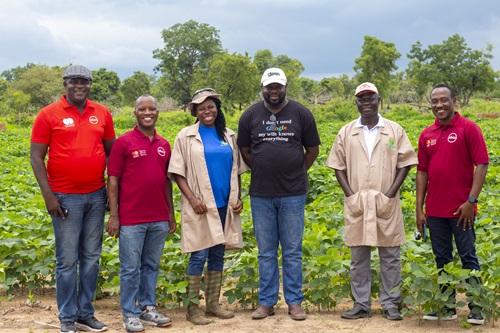
Absa Young Africa Works Project drives agricultural transformation in Ghana's Upper West Region
A significant agricultural transformation is taking place in Ghana's Upper West Region, spearheaded by the Absa Young Africa Works project. This initiative, a partnership between Absa Bank Ghana and the Mastercard Foundation, is empowering local farmers and entrepreneurs, driving economic growth, and creating sustainable livelihoods.
During a media visit to the project sites, William Brandford Nettey, Head of Agribusiness at Absa Bank, outlined the project's origins and goals. "Launched three years ago, the Absa Young Africa Works Project aims to support agribusinesses, particularly those led by women and young entrepreneurs. We partnered with the Mastercard Foundation to tackle challenges like high interest rates and lack of collateral, which were major obstacles to accessing financing," Nettey explained.
The project has made significant strides in reducing interest rates and boosting business growth. "Initially, loan uptake was low due to high interest rates of 40% to 45%. By working with the Mastercard Foundation, we managed to lower the rate to 10%, which has dramatically increased loan uptake and energized various sectors," Nettey added.
**Awo Fields Ltd: Expanding Impact in Wa**
Awo Fields Ltd, led by Joy Okrah, is one of the project's notable beneficiaries. "Before receiving support from Absa, we struggled to assist all the farmers who sought our help, especially women and youth. With the project, we've increased our outgrowers by 300, with 65% being women and youth. We've also expanded our own fields, producing maize, soybeans, groundnuts, rice, and sorghum," Okrah shared.
The subsidized interest rate has been crucial to their operations. "The 10% interest rate has given us the financial space to operate without pressure. It's allowed us to employ more people, increase crop production, and support more farmers," she added.
Okrah revealed plans to ensure sustainability through innovative projects, such as dry season vegetable production using renewable energy. "We're looking at using solar-powered boreholes and drip irrigation. Our field will also serve as a mentoring site for universities and agricultural institutions," she said.
**A. E. Farms: Growing and Diversifying in Wa-Jirapa**
Emmanuel Ahaa, CEO of A. E. Farms, praised the project's transformative impact. "The support from Absa Bank and the Mastercard Foundation has allowed us to increase our acreage and diversify our crops, including high-value ones like tomatoes and peppers. The lower interest rates enabled us to invest in better irrigation systems and farm machinery," Ahaa noted.
He also highlighted the project's positive effects on the community. "We've been able to employ more local youth, reducing unemployment in the area. We've also trained our workers in sustainable farming practices, leading to better yields and higher-quality produce," Ahaa added.
**Amadong Wonderful Limited: Empowering Women in Lambusie**
Issifu Amadong Niyariyor, CEO of Amadong Wonderful Limited, shared how the project has transformed his business. "We started as a sole proprietorship, but in 2021, we upgraded to a limited liability company. Through the Absa Young Africa Works Project, we've assisted about 1,210 clients, 90% of whom are women," Niyariyor said.
He described the significant growth his clients have experienced. "Many of these women used to cultivate only one acre, but now they can cultivate three to five acres. We've also expanded our staff from two to six members, with an equal gender balance," Niyariyor added.
Niyariyor encouraged young entrepreneurs to take agribusiness seriously. "Farming is a viable business. Don't give up, even when faced with challenges. With the right support, like the Absa Young Africa Works Project, success is within reach," he advised.
**Training and Capacity Building**
The project also places a strong emphasis on training and capacity building. "We included training to develop the capacities of small businesses. We've seen improvements in the lives of the people and the clients we work with," Nettey noted.
The project's impact is evident in the increased confidence and success of its beneficiaries. "We've seen women at the forefront of businesses. One client, who started with a GHS 200,000 loan, now receives up to 4 million Ghana cedis. The number of workers and the acreage they farm have increased significantly," Nettey remarked.
Reflecting on the visit to the Upper West Region, Nettey expressed his admiration for the project's success. "I'm impressed with the confidence and changes I've seen in the lives of the farmers. This project is making a real impact," he said.
Nettey remains optimistic about the project's sustainability. "The levels people have been lifted to are significant. They've learned how to borrow, keep their books, and interact with financial institutions. We aim to engage more partners to continue this impactful work," he concluded.
The Absa Young Africa Works Project is making a substantial impact on Ghana's agribusiness sector, empowering women and young entrepreneurs to thrive and contribute to the nation's economic growth.